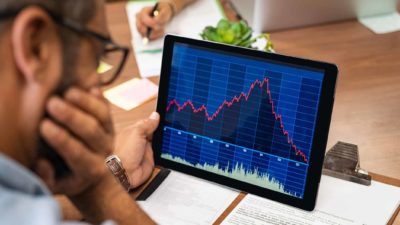Below, we analyse Reserve Bank of Australia (RBA) Governor Philip Lowe's recent (19 March) speech and its implications for S&P/ASX 200 Index (ASX: XJO) and the wider market.
1. COVID-19 market disruption is serious, but temporary
Lowe emphasised that while we find ourselves in a very serious situation, "it is something that is temporary." Lowe implored that we "look to the other side when things recover."
However, he also stressed that reaching the other side will require a bridge. Critically, without that bridge, "there will be more damage, some of which will be permanent, to the economy and to people's lives."
Although Lowe acknowledged that "further help will be required" to support businesses and households, he remains positive. In his view, "Australian public finances are in good shape" and Australia's "prudent fiscal management gives us the capacity to respond now."
2. The big 4 banks have an important role to play
Lowe identified the banks as key players during this crisis, stating that "without their support, it will be harder for us all to get to the other side in reasonable shape."
Commonwealth Bank of Australia (ASX: CBA), Westpac Banking Corp (ASX: WBC), National Australia Bank Ltd (ASX: NAB), and Australia and New Zealand Banking Group (ASX: ANZ) are in a solid position to provide this support, especially considering the recent statement from the Australian Prudential Regulation Authority (APRA).
In the statement, APRA pointed out that the "Australian banking system has built up substantial capital buffers". Further, banks are "typically maintaining capital levels well above minimum regulatory requirements."
APRA Chair Wayne Byres concluded that "even if the banking system utilises some of its current large buffers, it will still be operating comfortably above minimum regulatory requirements."
3. RBA is injecting extra liquidity into the financial system
Lowe revealed that over the past few weeks, the RBA has injected "substantial extra liquidity into the financial system through our daily market operations."
He also revealed that the RBA will conduct one-month and three-month repurchase (repo) operations each day.
In a key statistic, Lowe acknowledged that the Exchange Settlement balances have increased "from around $2.5 billion a month ago to over $20 billion today [19 March]."
The Reserve Bank is also ready to purchase Australian government bonds in the secondary market. Acknowledging that government bonds can serve as pricing benchmarks for many financial assets, the RBA is "prepared to support smooth market functioning".
4. Reduction in cash rate
As has been widely reported, the Reserve Bank recently cut interest rates further. Lowe admitted that "this is a substantial easing of monetary policy," which is nonetheless boosting the cash flow of businesses and the household sector as a whole.
He concluded that the "evidence is that lower interest rates do benefit the community as a whole, although I acknowledge that the effects are uneven."
Importantly, Lowe revealed that the RBA will not increase the cash rate until progress was made towards full employment and inflation was within the 2–3% range.
Crucially, this means that we are likely to be at this level of interest rates for "an extended period". The RBA's expectation is that the cash rate "will remain at its current level for some years, but not forever."
5. Funding facility for the banks, with support for business credit
This funding facility scheme has 2 aims, according to Lowe.
The first aim is to lower funding costs for the entire banking system and thus lower the cost of credit to households and businesses.
The second aim is to incentivise lenders to offer credit to small and medium-sized businesses. Importantly, this is a priority area for the RBA as it recognises that many small businesses will struggle in the next few months.
Lowe stressed that "if Australia lost lots of otherwise viable businesses through this period," recovery will be that much harder and "we will all pay the price for that."
These funding facility measures can also help ASX 200 companies like Afterpay Ltd (ASX: APT), for which relies on these small-to-medium-sized merchants as the hubs that process their underlying sales.
Conclusion
Lowe emphasised that the RBA expects a recovery once the coronavirus is contained. However, the convalescence depends in part on how we, "as a nation, build that bridge to the other side".
In his view, the RBA is doing everything in its power to lower funding costs in Australia and support the supply of credit to business.
Finally, according to Lowe, when Australia, the economy and the ASX 200 do recover, they will be supported by the low level of interest rates, interest rates that will not rise until Australia is once again on a strong footing.








